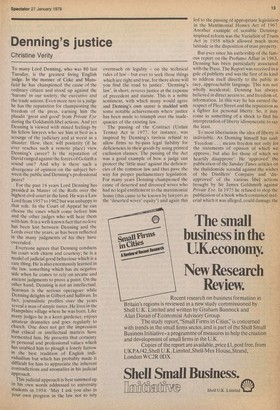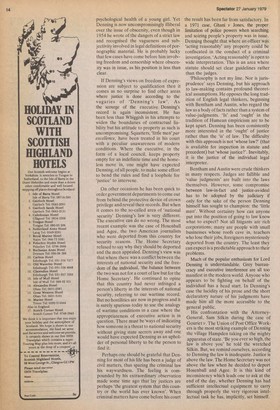Denning's justice
Christine Verity
To many Lord Denning, who was 80 last Tuesday, is the greatest living English judge. In the manner of Coke and Mansfield he has 'championed the cause of the ordinary citizen and stood up against the 'barons' in our society, the executive and the trade unions. Even more rare in a judge he has the reputation for championing the freedom of the press, earning him the plaudit 'great and good' from Private Eye during the Goldsmith libel actions. And yet Denning is viewed with mixed feelings by his fellow lawyers who see him at best as a scourge of the judiciary and at worst as a disaster. How, then, will posterity (if he ever reaches such a remote place) view Denning's career? Is the reputation of David ranged against the forces of Goliath a sound one? And why is there such a divergence of opinion on the subject between the public and Denning's professional peers?
For the past 16 years Lord Denning has presided as Master of the Rolls over the highest civil court in the land. He was a Law Lord from 1957 to 1962 but was unhappy in that role. In the Court of Appeal he can choose the cases which come before him and the other judges who will hear them with him. It is a well-known fact that no love has been lost between Denning and the Lords over the years, as has been reflected in the many judgments of his they have overruled.
Everyone agrees that Denning conducts his court with charm and courtesy; he is a model of judicial good behaviour which is a rare thing. He is also enormously learned in the law, something which has its negative side when he comes to rely on arcane and ancient judgments to prove a point. On the other hand, Denning is not an intellectual. Scarman is the serious operagoer while Denning delights in Gilbert and Sullivan. In fact, journalistic profiles over the years reveal a man of simple tastes. He lives in the Hampshire village where he was born. Like many judges he is a keen gardener, enjoys amateur dramatics and goes regularly to church. One does not get the impression that ethical or intellectual matters have tormented him. He presents that certainty in personal and professional values which has enabled him to plough a lonely furrow in the best tradition of English individualism but which has probably made it difficult for him to appreciate the inherent contradictions and anomalies in his judicial approach.
This judicial approach is best summed up in his own words addressed to university students in 1954: 'May I ask you also in your own progress in the law not to rely overmuch on legality — on the technical rules of law — but ever to seek those things which are right and true, for there alone will you find the road to justice'. 'Denning's law', in short, reveres justice at the expense of precedent and statute. This is a noble sentiment, with which many would agree and Denning's own career is studded with some notable achievements where justice has been made to triumph over the inadequacies of the existing law.
The passing of the Contract (Unfair Terms) Act in 1977; for instance, was inspired by Denning's tireless refusal to allow firms to by-pass legal liability for deficiencies in their goods by using printed exclusion clauses. The passing of the Act was a good example of how a judge can protect the 'little man' against the deficiencies of the common law and thus pave the way for proper parliamentary legislation. For many years Denning championed the cause of deserted and divorced wives who had no legal entitlement to the matrimonial home (this came to be known by lawyers as the 'deserted wives' equity') and again this led to the passing of appropriate legislation in the Matrimonial Homes Act of 1967. Another example of sensible Denninginspired reform was the Variation of Trusts Act in 1958 which allowed much more latitude in the disposition of trust property.
But ever since his authorship of the famous report on the Profumo Affair in 1963, Denning has been particularly associated with the Press. The Report was received in a gale of publicity and was the first of its kind to address itself directly to the public in racy, approachable language. This was not wholly accidental; Denning has always believed in direct access to, and freedom of, information. In this way he has earned the respect of Fleet Street and the reputation as a fighter for personal liberty. So, it may come as something of a shock to find his interpretation of liberty idiosyncratic to say the least.
To most libertarians the idea of liberty is indivisible. As Denning himself has said: 'Freedom . . . means freedon not only for the statements of opinion of which we approve, but also for those of which we heartily disapprove'. He 'approved' the publication of the Sunday Times articles on the thalidomide scandal against the wishes 'of the Distillers' Company and 'disapproved' of the various libel actions brought by Sir James Goldsmith against Private Eye. In 1975 he refused to stop the publication of a book which contained material which it was alleged, could damage the psychological health of a young girl. Yet Denning is now uncompromisingly illiberal over the issue of obscenity, even though in 1954 he wrote of the dangers of a strict law and recognised the vagueness and subjectivity involved in legal definitions of pornographic material. He is probably lucky that few cases have come before him involving freedom and censorship where obscenity was in issue, as his position is less than clear.
If Denning's views on freedom of expression are subject to qualification then it comes as no surprise to find other areas where justice is done according to the vagaries of 'Denning's law'. As, the scourge of the executive, Denning's record is again inconsistent. He has been less than Whiggish in his attempts to widen the boundaries of contractual liability but his attitude to property as such is uncompromising. Squatters, 'little men' par excellence, have been treated in his court with a peculiar unawareness of modern conditions. Where the executive, in the form of a local council, keeps property empty for an indefinite time and the homeless move in, one might have expected Denning, of all people, to make some effort to bend the rules and find a loophole for 'justice' to intervene.
On other occasions he has been quick to order government departments to come out from behind the protective device of crown privilege and reveal their records. But when it comes to the so-called area of 'national security' Denning's law is very different. The executive can do no wrong. The most recent example was the case of Hosenball and Agee, the two American journalists who were deported from this country for security reasons. The Home Secretary refused to say why they should be deported and the men appealed. Denning's view was that where there was a conflict between the interests of national security and the freedom of the individual, `the balance between the two was not for a court of law but for the Home Secretary'. He continued to opine that this country had never infringed a person's liberty in the interests of national security, referring to our wartime record. But no hostilities are now in progress and it is surely spurious today to use the analogy of wartime conditions in a case where the appropriateness of executive action is in question. There must be-ways of indicating how someone is a threat to national security without giving state secrets away and one would have expected Denning as an upholder of personal liberty to be the person to find it.
Perhaps one should be grateful that Denning for most of his life has been a judge of civil matters, thus sparing the criminal law his waywardness. The feeling is compounded by his extraordinary observation made some time ago that lay justices are perhaps 'the greatest system that this country or the world has ever known'. When criminal matters have come before his court the result has been far from satisfactory. In a 1971 case, Ghani v Jones, the proper limitation of police powers when searching and seizing people's property was in issue. Denning thought that where an officer was 'acting reasonably' any property could be confiscated in the conduct of a criminal investigation. 'Acting reasonably' is open to wide interpretation. This is an area where statute should set clear guidelines rather than the judges.
'Philosophy is not my line. Nor is jurisprudence' says Denning, but his approach to law-making contains profound theoretical assumptions. He opposes the long tradition of English legal thinkers, beginning with Bentham and Austin, who regard the law as a body of facts rather than a system of value-judgments. 'Is' and 'ought' in the tradition of Humean empiricism are to be kept apart. Denning has been consistently more interested in the 'ought' of justice rather than the 'is' of law. The difficulty with this approach is not 'whose law?' (that is available for inspection in statute and precedent) but 'whose justice?'. Inevitably, it is the justice of the individual legal interpreter.
Bentham and Austin were crude thinkers in many respects. Judges are fallible and 'value judgments' are built into the laws themselves. However, some compromise between law-in-fact and justice-as-ideal has to be adopted by the judiciary if only for the sake of the person Denning himself has sought to champion: the 'little man'. Without certainty how can anyone put into the position of going to law know what to expect? Not all litigants are rich corporations; many are people with small businesses whose roofs cave in, teachers who lose their jobs, foreigners mysteriously deported from the country. The least they can expect is a predictable approach to their problems.
Much of the popular enthusiasm for Lord Denning is understandable. Grey bureaucracy and executive interference are all too manifest in the modern world. Anyone who appears to be fighting on behalf of the individual has a head start. In Denning's case the lucidity of his prose and the short declaratory nature of his judgments have made him all the more accessible to the general public.
His confrontation with the AttorneyGeneral, Sam Silkin during the case of Gouriet v. The Union of Post Office Work ers is the most striking example of Denning the village Hampden taking on the mighty apparatus of state. 'Be you ever so high, the law is above you' he told the wretched Silkin. But, we remind ourselves, according to Denning the law is inadequate. Justice is above the law. The Home Secretary was not above the law when he decided to deport Hosenball and Agee. It is this kind of inconsistency which leads one to ask at the end of the day, whether Denning has had sufficient intellectual equipment to carry through properly the very rigorous intellectual task he has, implicitly, set himself.







































 Previous page
Previous page